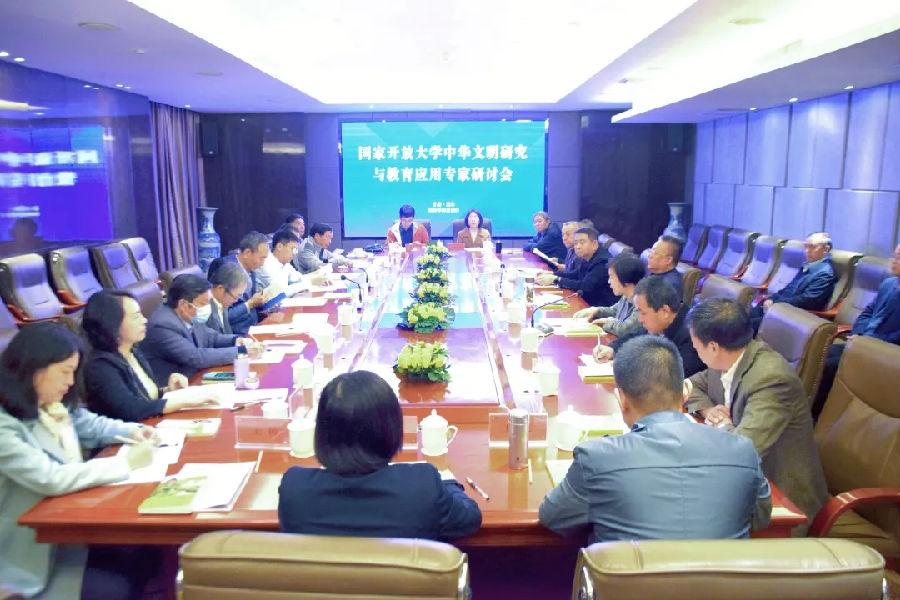 Recently, the Open University of China (OUC) held an expert seminar on “Research on Chinese Civilisation and its Use in Education” in Tianshui, Gansu Province.
Recently, the Open University of China (OUC) held an expert seminar on “Research on Chinese Civilisation and its Use in Education” in Tianshui, Gansu Province.
More than 30 experts and young scholars from the OUC, Gansu Open University (Gansu OU) and its Tianshui branch, the Tianshui Education Bureau, the Party School of the Central Committee of CPC (National Academy of Governance), the Chinese Academy of Social Sciences (CASS), Zhengzhou University, and the Tianshui Museum attended.

The seminar aimed to study and implement the guiding principles of a series of important speeches on Chinese civilisation given by General Secretary Xi Jinping, explore the educational value of Chinese civilisation, make use of the “Four Platforms” of the OUC, and apply the results of archaeological and historical research to education.
Ju Chuanjin, vice president of the OUC, attended the seminar and delivered a speech. He stressed the importance of discussing in-depth the prospects of applying Chinese civilisation on the basis of solid research, and that open universities have a clear mission to disseminate traditional Chinese culture as the basis of innovative transformation of Chinese civilisation.
Wang Hongning, president of Gansu OU, pointed out in his speech that it and its Tianshui Branch, as parts of the OUC system, have taken the dissemination of traditional Chinese culture as a major responsibility, focusing on continuing education (degree and non-degree) and teacher training, promoting traditional culture, especially regional culture, and integrating it with open education.
Shen Jianling, director of the Tianshui Education Bureau, pointed out in her speech that it is rare for Tianshui to host such a high-level seminar. She expressed the hope that all the leaders and experts would provide their professional opinions on the reform and development of education, especially open education, in Tianshui, so as to accelerate the transformation of open education there.
On the topic of “Origins of Chinese Civilisation and a New Form of Human Civilisation”, experts in archaeology, philology, philosophy, culture, and museums, including Zhu Lijia, professor of the Party School of the Central Committee of the CPC (National Academy of Governance); Zhao Chunqing, researcher with the CASS Institute of Archaeology; Wang Zhiping, researcher with the CASS Institute of Linguistics; Li Yunfu, professor at Zhengzhou University; and Li Ningmin, curator of the Tianshui Museum, shared their views on new developments in research on the sources of Chinese civilisation, the relationships between written language and civilisation, research on regional cultural heritage, new forms of human civilisation, and the application of Chinese civilisation to education. Together they appealed for different disciplines to come together to promote the dissemination of traditional Chinese culture on a variety of various platforms. Professor Sun Fuwan, executive vice dean of the School of Marxism of the OUC, and director of the Research Centre for Traditional Chinese Culture, presided over the discussion, and concluded that tracing the history of civilisation is a pursuit common to all Chinese, and also a measure of cultural confidence. In the discussion of the “Application of Research on Chinese Civilisation to Education”, Lian Jiapeng from the CASS Institute of Linguistics; Wang Haiping from the OUC Faculty of Humanities; Wang Shuo from the OUC International Department (Chinese Language Centre); Ji Zhe from the Multi-media Press of OUC Publishing Media Group; Wang Xinyou from the School of Science and Engineering of Gansu OU; Ma Saili and Deng Ailing from the OUC’s Tianshui Branch and Zhou Xiulan from the Tianshui Museum spoke about their research. Reviewing the speeches, the experts praised the achievements of the OUC in course construction, audio-visual products and their dissemination overseas, and the dissemination of traditional Chinese culture. They also gave suggestions for expanding into related fields in order to bring research into Chinese history and civilisation to every Chinese citizen, and indeed to the whole world.
While in Tianshui, Ju Chuanjin and Wang Hongning led a research team of 13 to the Tianshui branch for discussions. These were presided over by Wang Xiaojuan, vice mayor of Tianshui city, and attended by more than 40 others, including Yang Aimin, deputy director of Tianshui Bureau of Education; Li Ziyuan, deputy secretary of the Party Committee, and president of Tianshui Branch; Li Long, secretary of the Party Committee of Tianshui Branch; members of the university leadership, mid-level cadres, and members of Tianshui county and district workstations.
By OUC